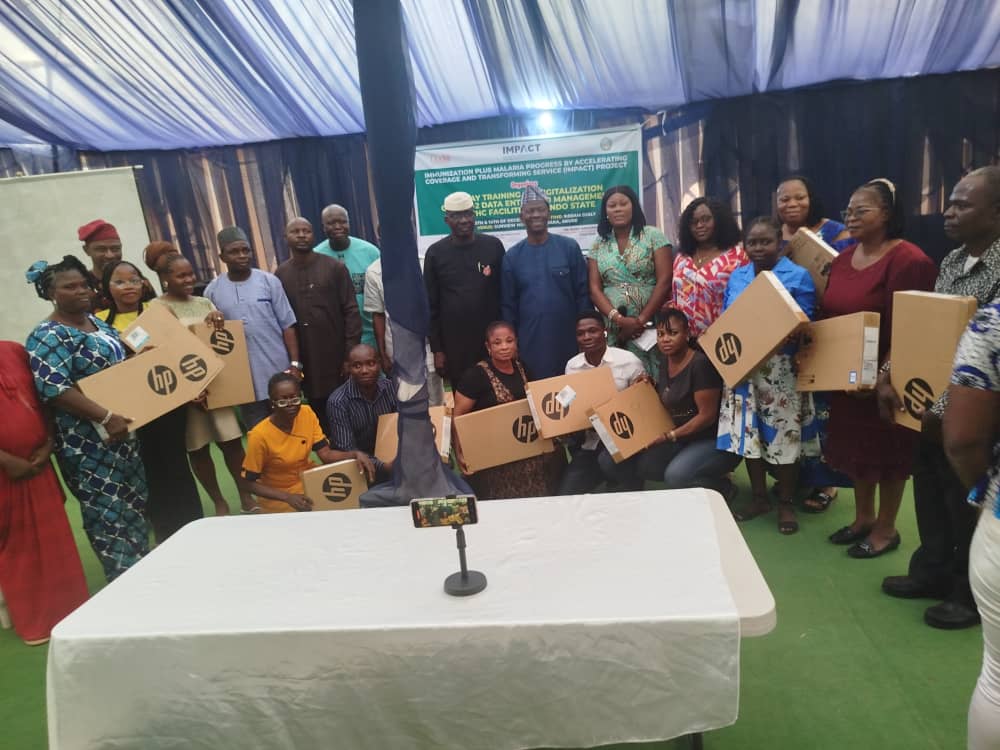Ondo Govt. begins digitalisation of primary healthcare services
The Ondo State Government through the “IMPACT PROJECT” (a World Bank Assisted Project) has commenced the digitalisation of primary health facilities across all the 203 wards in the state.
The process began with training of health facilities Health Management Information System (HMIS) officers and distribution of 216 laptops.
Speaking at the programme in Akure, the state Commissioner for Health, Dr Banji Ajaka, lauded the efforts of Gov. Lucky Ayedatiwa for his initiatives and ingenuity at transforming the health sector.
Ajaka said with the training and distribution of the laptops to the HMIS officers, the state primary health care system had joined the digitalised world, saying the era of papers and files for keeping health was over.
Ajaka, who enumerated the importance of the digitalisation process in the sector, said the process would make the job seamless for health workers as accessing data would be easier as well as reducing the stress and rigour of moving hardcopies from one location to the other .
He explained further that the period of hazards when burglary, moths, fire occurrence, rainstorm and other natural disasters destroyed records at the facilities had become a thing of the past.
Ajaka thanked the World Bank through the IMPACT project, the Federal Ministry of Health (FMoH) and the National Primary Health Care Development Agency (NPHCDA) for making the state a beneficiary of the programme.
The commissioner noted that changing from analogue to electronic data processing was no mean feat to be accomplished in the state.
He advised the HMIS officers to guide the laptops properly and use them for the purpose which they were meant to serve.
He equally assured them that the ongoing training would not be a one off as there would be training and re-training of health workers in the state for regular updates to make the system effective on data management.
Also speaking, the Special Adviser on Health to the State Governor, Prof. Simidele Odimayo, appreciated the health workers for their dedication to health promotion across the 18 local governments.
Odimayo expressed gratitude to the state governor for his support and commitment in advancing health system strengthening and development in the state.
The SA highlighted the importance of data-driven decision-making, stating that working without data and proper presentation of results, was inadequate.
He said that the use of computers aligned with modern trends and international best practices in the health sector.
In his remarks, the Permanent Secretary of Ondo State Primary Healthcare Development Agency, Dr Francis Akanbiemu, said the government of Ayedatiwa in collaboration with the World Bank through had invested heavily in the sector.
Akanbiemu urged the health workers who provided services at the facilities to allow the residents to get the benefits of the investment.
He stressed that the best way to showcase performances at the health facilities was through accurate and quality data presentation and thereby urged the HMIS officers to put the laptops to effective use .
Akanbiemu who advised that the laptops should be used with voltage protector devices hinted that electronic data processing has the advantage of producing error free services because it has auto corrective functions in the system.
The Programme Manager of IMPACT (Immunisation Plus) Project in Ondo State, Dr Paulinus Kunle Omode, thanked the state governor for providing the enabling environment and support for the sector.
Omode extended the appreciation to the World Bank for the financial assistance on the need to leverage information communication technology (ICT) to digitalise the primary health care system.
Speaking on behalf of other HMIS Officers, the state HMIS Officer, Mrs Mojisola Odunola, thanked the state government for the new innovation in the health sector.
Odunola said that the use of laptops would accelerate the process of data collation and processing,pledging that the laptops would be judiciously utilized by HMIS officers to improve data gathering and services of the health facilities.
The 203 laptops are for PHC facilities in the 203 political wards of the state, the remaining 13 are for local government PHC authorities on the HMIS officers who had earlier complained of faulty laptops during routine inspections.














Post Comment